Men on 1970s pro-paedophile list could still work with children today
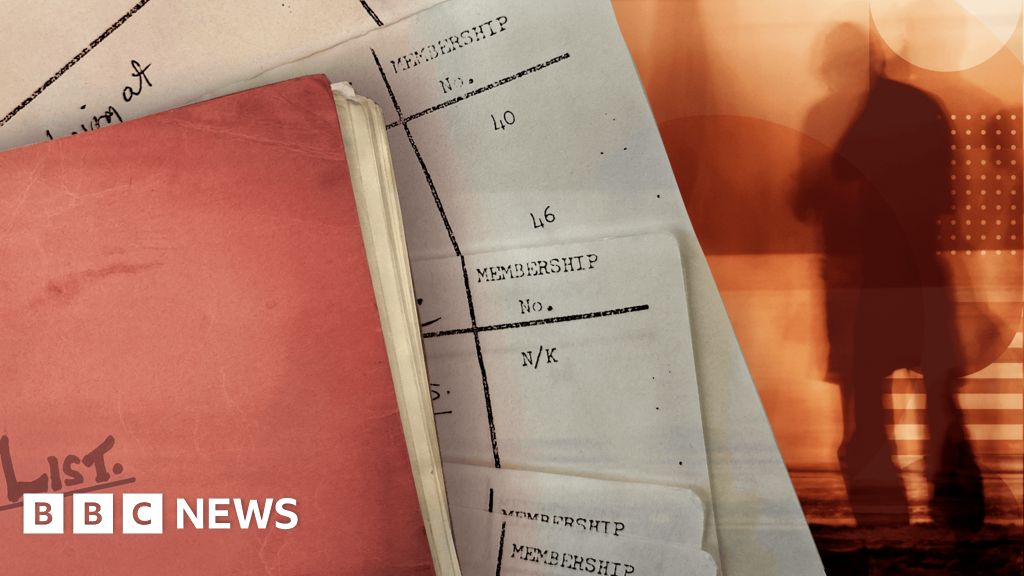
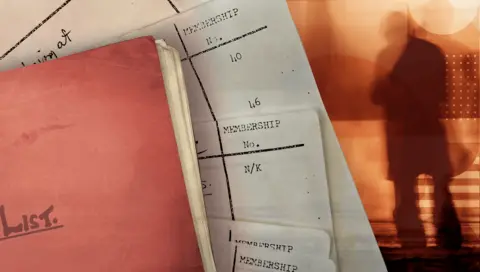 BBC
BBCA secret list of more than 300 people who belonged to a network that called publicly for the legalisation of sex with children has been handed to the BBC.
A small number of those named on the list may still have contact with children through paid work or volunteering, the BBC has discovered.
They were all members of a group called the Paedophile Information Exchange (PIE).
The Metropolitan Police had the list for about 20 years from the late 1970s, a BBC Radio 4 podcast team has been told.
Spread across several dozen pages, with a pink cover page added by police in the early 1980s, the typed list contains 316 names – all but a handful men, most with addresses alongside.
Most PIE members were based in the UK – but there are also details of people in other parts of western Europe, Australia and the US.
The BBC has established that a small number of the men are still alive and may currently be in contact with, or have care of, children through paid work or volunteering. The BBC has found no evidence any of them has carried out abuse.
The Met told us it was unable to provide specific information about its historical investigations into the Paedophile Information Exchange – but will still investigate crimes if sufficient evidence exists and alleged perpetrators are still alive.
PIE was formed in 1974 – when the country was going through rapid transformative social change. Its leaders sought to further their cause by attempting to align themselves with feminist, anti-racist and gay rights movements. It was not an illegal organisation and cost £4 a year to join, and to receive its members’ magazine.
Over a decade, PIE spokesmen gave interviews to the media arguing that adults and children had a human right to have sex with each other. Four years old, they argued, was an age at which most children could give consent.
However, while PIE’s leaders may have been happy to speak publicly, the names of rank-and-file members were very much kept secret.
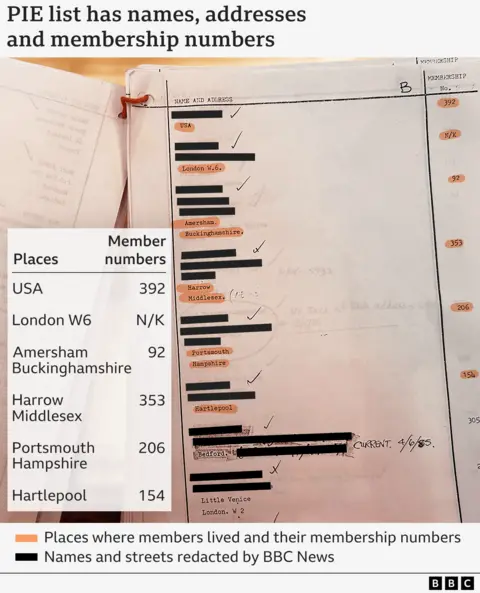
The list – and dozens of other documents relating to PIE members – were given to the BBC team and journalist Alex Renton, who has written extensively about historical institutional child sexual abuse and presents the BBC podcast, In Dark Corners.
We then searched for the names in media archives, crime reports and death register listings from the past 50 years.
They found records or further information for 45% of the people on the list – with a reasonable degree of certainty – and discovered that half of them had been convicted or cautioned (or had been charged and died before trial) for sexual offences against children. Charges included distributing abuse images, kidnap and rape.
Of the small number of men who may still be in contact with children professionally, none has any criminal conviction that the BBC has been able to find – meaning they could have passed in-depth background checks when applying for jobs.
Those men are part of a wider group of nearly 70 on the list, who the BBC team has identified as having been in work likely to bring them into contact with minors.
Teachers make up half that group – work addresses are typed alongside some of the names on the list. The rest include social workers, sports coaches, youth workers, doctors, clergy, lay preachers and military officers involved in youth activities.
The podcast team tried to contact all those people still alive and working – most of whom are believed to be living in the UK.
One claimed his name was on the list because of PIE’s links in the 1970s with a gay youth support group.
A second admitted he had been a member, but only because he had agreed with PIE that the disparity in the age of consent laws was unjust. Men in England and Wales had to be 21 to have sex with other men prior to 1994 – when the legal age was lowered to 18. Six years later it was reduced to 16, in line with straight sex. The man told the BBC he was not and never had been a paedophile.
A third man, currently teaching children in a private school outside of the UK, refused to speak any further after PIE was mentioned to him.
No-one else has so far responded to approaches by the BBC.
The BBC team obtained the PIE list from a former senior social worker – Peter McKelvie – who handed over a shopping bag full of historical documents, letters, internal memos and old newspaper cuttings spanning three decades.
Through his work, Mr McKelvie had started seeing connections between child abusers in the information he collected through his work – but gradually became frustrated about the abilities of police or social services to stop paedophile networks.
The PIE list came into his possession in 1998. Until then, for about 20 years, it had been in the hands of the Metropolitan Police’s Obscene Publications Unit, known internally as “The Dirty Squad”.
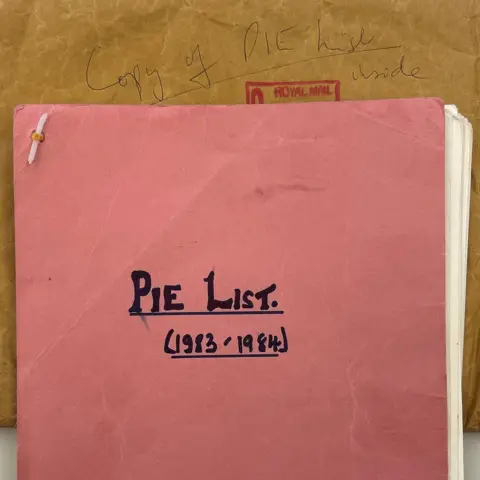
The former officer who handed it over, Dave Flanagan, told the BBC he believed the list may originally have been seized in a police raid in the late 1970s.
The document given to the BBC has scribbled notes in the margins – and Mr Flanagan, a detective constable at the time, says he wrote some of them.
He also attached and dated the pink cover page – as he and colleagues added more up-to-date PIE intelligence during the 1980s.
Police raided plenty of people on the list, he says – but, on its own, it was unusable as information for a search warrant.
“You couldn’t go in front of a magistrate and say: ‘Look, we believe he’s a paedophile. We believe there’ll be indecent photographs of children because he’s on the PIE list.'”
Legally, being a member of a pro-paedophile group didn’t make someone a sex offender.
Police did manage to close in on PIE in the early 1980s – focusing on three senior members who all had links to contact adverts in the members’ magazine, Magpie.
The men were prosecuted under a 17th Century law of “conspiracy to corrupt public morals”. Two received conditional discharges, while the third was jailed for two years.
Publicly, PIE ceased to exist in 1984.
Dave Flanagan says his team’s detective work on the membership list also ground to a halt.
“Information was passed to other police forces and they did what they did with it – we had no control over any of that.”
The BBC understands the PIE list was digitised in 1994 by a police team that no longer exists. The National Crime Agency, which was formed in 2013 and whose officers deal with child abuse cases, told us it has “no knowledge of receiving the [digitised] list”.
Dave Flanagan kept the original in his briefcase until he retired in 1998, when he handed it to Peter McKelvie.
Mr McKelvie told the BBC that over the past 30 years he had pushed police, a Labour MP and a Conservative government minister to look at PIE members linked to social services and special schools, but without success.
He wrote to the Department of Health in 1993 outlining his concerns. His letter began: “The infiltration of the social work profession by paedophiles appears to be an extensive and serious problem…”
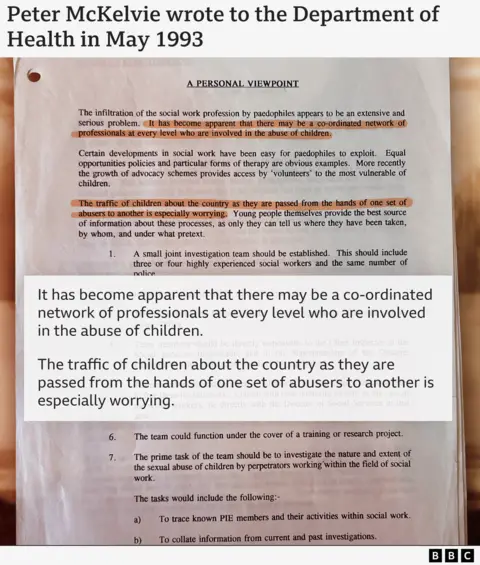
He suggested the formation of a specialist team of social workers and police to track down every member of PIE working in social care. The letter got no response, he says.
The Department for Health and Social Care told the BBC it could not comment on “individual historic cases”.
On Monday, Home Secretary Yvette Cooper said those who cover up or fail to report child sexual abuse could face professional or criminal sanctions under a new offence to be introduced this year.
The proposal was one of 20 recommendations made by Prof Alexis Jay following her seven-year inquiry into child sex abuse, which concluded in 2022. The Independent Inquiry Child Sexual Abuse (IICSA) was set up in response to concerns that some organisations had failed to protect children.
In a statement, Det Supt Nicola Franklin, from the Met’s Central Specialist Command, said the force was “committed to tackling” paedophilia, “an abhorrent crime”.
“If anyone has information that should be shared with police we would urge them to do so. Despite the passage of time, we will still investigate provided sufficient evidence exists to do so and the perpetrator is still alive.”
Reporting team: Alex Renton, Caitlin Smith, Gillian Wheelan
World News || Latest News || U.S. News
Source link




